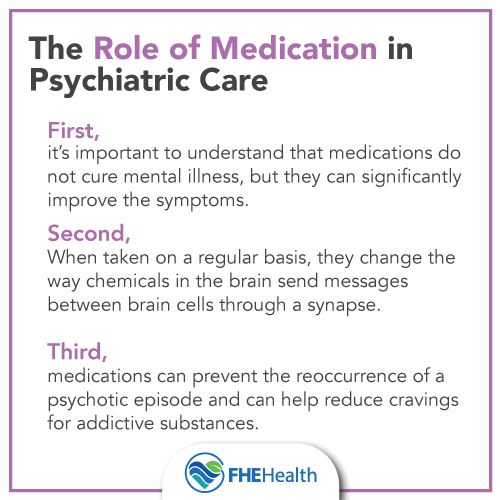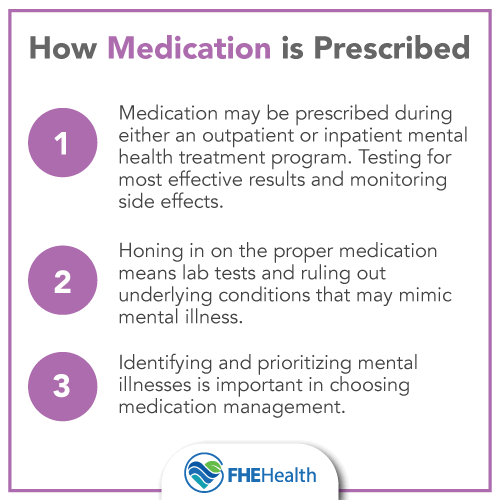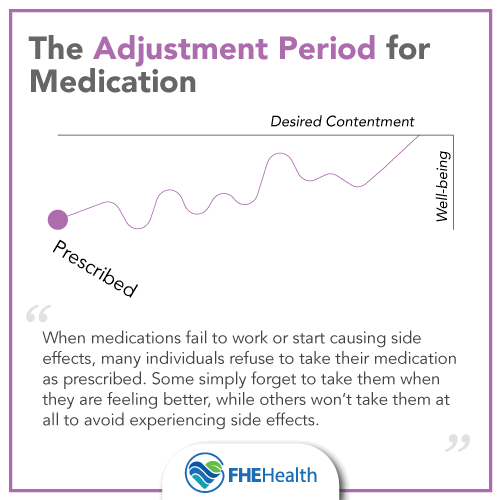
Tens of millions of Americans suffer from some type of mental illness, according to the National Institute of Mental Health. Of those, approximately one in six adults takes psychiatric drugs. Medications are often given to help reduce symptoms and prevent relapses of a psychiatric disorder, so they play an important part in the overall treatment and rehab of those in both outpatient and inpatient mental health treatment. While some do well when taking prescription medications long-term, others experience side effects that leave them wanting to discontinue use. This may also lead some to wonder whether they need to take medications for life. At FHE, our team of specialists can help determine the best course of treatment, including whether to medicate.
Role of Medications in Mental Health Treatment
 There are several different types of drugs used to treat mental illness. These include antianxiety medications, antidepressants, mood stabilizers, antipsychotic drugs and stimulants. The type of drug prescribed depends on your diagnosis.
There are several different types of drugs used to treat mental illness. These include antianxiety medications, antidepressants, mood stabilizers, antipsychotic drugs and stimulants. The type of drug prescribed depends on your diagnosis.
First, it’s important to understand that medications do not cure mental illness, but they can significantly improve the symptoms. Mental health medications, like aripiprazole and Amisulpride, work by acting on the brain and central nervous system. When taken on a regular basis, they change the way chemicals in the brain send messages between brain cells through a synapse. The result is an overall feeling of contentment.
Aside from reducing symptoms, medications can prevent the reoccurrence of a psychotic disorder and can help reduce cravings for addictive substances. For those who are concerned about substituting one medication for another in the treatment of drug addiction, it’s important to understand that taking medications prescribed to treat mental illness isn’t considered substance abuse. Medications used to manage a patient’s mood are much different than those used to alter the mood.
New medications are constantly being developed that help treat mental illness. In the 1950s, medications were created to block dopamine. While they were effective at controlling psychotic episodes, they also caused joint stiffness, shakiness, slowed thinking and restlessness. Newer medications block less dopamine, which reduces the number and severity of side effects, and they tend to be much more effective at improving symptoms. For this reason, medications are frequently updated and changed throughout the course of treatment.
Prescribing Information
 Medications for mental health treatment may be prescribed during either an outpatient or inpatient mental health treatment program. At FHE, we prefer to prescribe medications for patients in inpatient treatment, which makes it easier to test for the most effective medication, watch for side effects and address any underlying conditions.
Medications for mental health treatment may be prescribed during either an outpatient or inpatient mental health treatment program. At FHE, we prefer to prescribe medications for patients in inpatient treatment, which makes it easier to test for the most effective medication, watch for side effects and address any underlying conditions.
To determine the proper medication, the doctor will first rule out any underlying conditions, such as physical problems that could be causing symptoms that mimic mental illness. Lab tests are also performed to test the thyroid, which regulates hormones, and screenings are given for alcohol and drug use. Finally, a physician will sit and discuss your symptoms, feelings, behavior patterns and any recurring thoughts.
It’s not always easy to determine which mental illness might be causing the symptoms, but it’s important to take the time to get an accurate diagnosis. Most mental health professionals read through case studies and publications like the Diagnostic and Statistical Manual of Mental Disorders to help determine the diagnosis and the correct method of treatment. This makes it easier to determine the best type of medication to start with.
Understanding Medications
Whether you’ve recently started a treatment plan for mental health or you’ve been on medications for some time, you may wonder, “Am I going to be on meds forever?” For some patients, drugs may be a short-term answer to help get you through the beginning stages of your treatment. For others, like those with bipolar disorder or frequent episodes of mania, depression or hypomania, medications may be long-term or even lifelong. According to CBS News, at least one in six adult Americans takes a psychiatric drug over the course of at least a year.
The good news is most people find medications are very helpful during their treatment and on the road to recovery. Some experience very few side effects and see an improvement with depression and other symptoms almost immediately. During this time, it’s not uncommon for individuals to stop taking the medication when they start feeling better, but it’s important to continue taking them.
If you’re experiencing severe side effects, you need to remember that many of the reactions you’re having are temporary and it just takes time for your body to acclimate to the drugs. However, you should always let your doctor know what’s happening with your treatment if you experience anything unusual.
Common side effects can include:
- Decreased appetite
- Weight loss
- Headaches
- Jitteriness
- Social withdrawal
- Sleep problems
- Psychotic or manic episodes
- High blood pressure
- Growth issues in young children
Adjustment Periods for Medications
 When receiving treatment, it’s important to consider that very few medications for mental illness provide instant relief. Because they influence the chemicals in the brain that regulate emotions and thought patterns, it often takes weeks and sometimes months for the medication to become fully effective. In some cases, it may take trial and error with several different types of medications to find one that works well. Some individuals may even need to take more than one type of medication at a time to ease the symptoms.
When receiving treatment, it’s important to consider that very few medications for mental illness provide instant relief. Because they influence the chemicals in the brain that regulate emotions and thought patterns, it often takes weeks and sometimes months for the medication to become fully effective. In some cases, it may take trial and error with several different types of medications to find one that works well. Some individuals may even need to take more than one type of medication at a time to ease the symptoms.
When medications fail to work or start causing side effects, many individuals refuse to take their medication as prescribed. Some simply forget to take them when they are feeling better, while others won’t take them at all to avoid experiencing side effects. In either case, you should speak to your physician to the medication or its dosage changed rather than suddenly discontinuing the drug.
It’s important to be consistent when taking your prescriptions in order to achieve the best results, even if you aren’t feeling the effects as quickly as you expected to. However, if you’ve been on the same medication for several weeks and haven’t noticed any improvement at all, you may want to consult your health provider to discuss an adjustment.
Eventually, it may be possible to wean off the medication, but the decision should always be made with a health professional. With psychiatric drugs, it’s important to wean yourself slowly. This allows your brain chemicals to adjust to the change without causing uncomfortable side effects.
Medications provide an effective treatment for mental illness. In order to get the most out of your inpatient mental health treatment, you should understand the medications you are taking and take them as proscribed. For more information on different types of psychiatric drugs and answers about treatment, contact our caring staff at FHE Health for more information.






